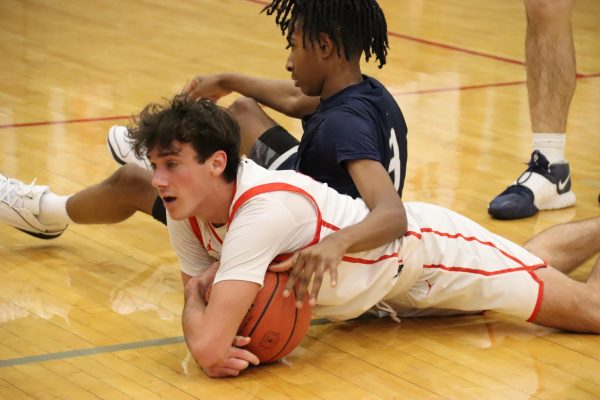An Education Issue
Step by step, my feet bring me closer to class as my mind longs to be elsewhere. Breathing in and out, I mentally prepare for the exhaustion I will face today. I take my seat.
Tapping my pencil up and down, a test is placed in front of me. Staring down at the clean sheet, I’m frozen with indecision trying to decide where to begin, meanwhile other students appear to work through the questions with ease. Accepting defeat, my mind wanders. How does everyone else know so much? I hear the timer’s slow tick just as the ringer echoes throughout the silent room. Maybe, I’m just not smart.
American education is prescribed within a strict set of rules. Teachers follow a required teaching method and students are expected to understand each concept. If only that actually worked.
The majority of students, learn in diverse and unique ways. We do not all understand a concept after a single lecture. Yet, when we don’t we question our own ability. Teachers and administrators cannot expect students to thrive in an education system that does not coincide with how they learn.
This issue only gets worse as students move through grade levels and begin to enroll in increasingly difficult courses. Ironically, teachers of advanced courses are often the most rigid in their teaching having two expectations for their students: listen to the lecture and take notes. While that methodology may work for some students, most feel bored, confused and unsure of themselves. Suddenly, a “successful” students finds it difficult to understand the material. Some teachers are unwilling to adjust their methods, often arguing that they are preparing us for colleges professors that operate solely on lecturing and note-taking.
“I don’t like teachers that spout facts at us,” junior Lindsay Meyer said. “I lose interest easily and can’t understand what the teachers are saying.”
Students are often forced to deal with being talked at for seven hours a day, five days a week. Anyone can reach a breaking point where it becomes difficult to pay attention to content and stay interested.
“School feels boring, when it’s just lectures,” Meyer said. “It’s really easy for me to lose interest in class or in a subject when a teacher is just reading bullets off of a Powerpoint. I wish there was more of a variety in what we did every day at school so that I could feel interested and in turn understand the subjects being taught better.”
Adding to the overwhelming stress of learning volumes of information in a tired delivery format, our work of solving math problems or writing English essays must be completed in particular formats. Students are required to do assignments, not in a way that suits or benefits them, but by teacher standards that are personality driven. Some students don’t understand, or don’t feel comfortable adopting this “standard method” and are docked points for attempting to navigate their own way.
“Since I started middle school, I have had a problem where my learning cannot be recognized,” Meyer said. “For example in math, I’d find shortcuts around problems and teachers would say ‘oh that’s so smart, but you just can’t do it that way.’”
Intelligent, insightful students are being penalized for being creative. Instead of denouncing a student’s unique process, teachers should recognize the student’s effort and try to understand the level of their analysis.
“I would love to see some change in education, so that more learning methods can be acknowledged” Meyers said. “I would like to see schools encourage creativity in learning, and make strict grading more personalized and adaptable for each person.”
Teachers rarely seem to grasp that a student’s input on an issue is often just as important as an adults. Certainly, not all teachers are set in their methods to the detriment of their students. Teacher Karen Tritt works actively working to improve the delivery of education. Instead of attempting to make her job easier by following one plan, she frequently changes and adapts curriculum to lead students to success.
“In Spanish, we look at students and what they can do with language, rather than how well they play the game of school.” Tritt said. “It is about how proficient they are with language, it isn’t about how well you can fill in the blanks of a worksheet anymore.”
The goal of education should be to expand the window of success instead of closing it. This expansion can be accomplished by providing formative practice to students, improving their learning before they are assessed on an exam. Tritt further explained that formative exercises and homework assignments leave room for mistakes and errors without it affecting a students grade. Stress levels are reduced, and students can navigate their way through the class, discovering the best methods for them without fear of being penalized. Practicing a concept in a
method that helps the student means that end of unit exams are less stressful and easier on the student.
Moreover, Tritt strives to make each class interesting and beneficial for each of her students. She often includes various activities, games and interactive ways of learning to capture the students’ attention by minimizing the amount of time spent lecturing.
“I have to tell you I’m embarrassed by how I used to teach. The kids who had good grades were the ones who could play the game of school, they were not the ones who could speak Spanish the best.” Tritt said. “I have come a full 180 from where I was, even from just 10 years ago. It’s now so focused on building people who can communicate.”
Tritt has championed Standard-Based Grading Systems and interactive teaching methods. She believes these new methods have shown significant positive change in her students over the years, supporting the claim that different methods of teaching or grading can impact students. School can and should be taught in diverse ways to increase success.
The Blue Valley School District and Principal Dr. Brett Potts acknowledge these issues and provide teachers, experienced and new, with empirical research and professional development showing teachers the positive impact new methods have on student learning, engagement and academic confidence.
The district is offering a Design Camp on Oct. 6 where teachers can “re-envision learning.” That’s wonderful. Until every teacher and administrator accepts that the time for change is now, students will continue to suffer through boring lectures and frustrating results.












